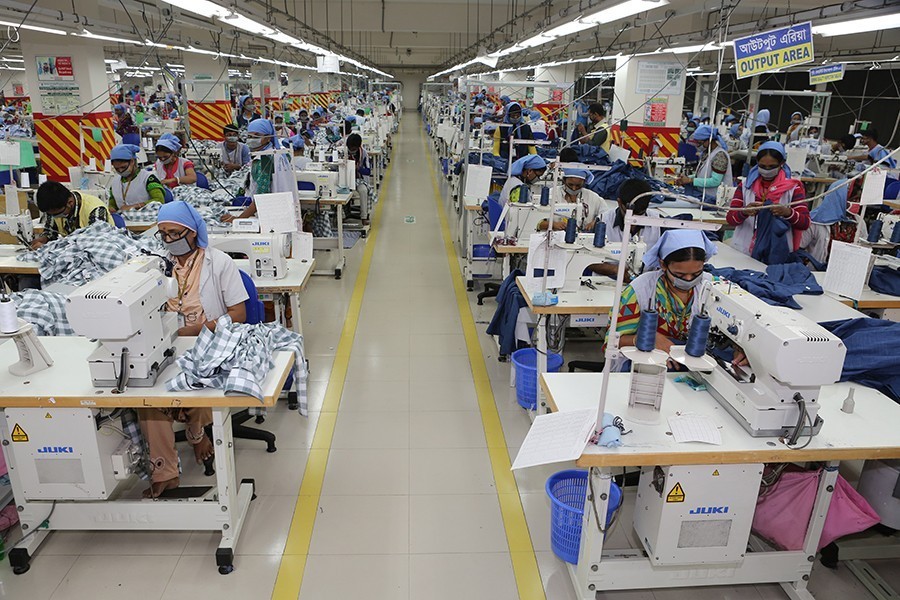'Allow FDI in RMG sector'
Analysts suggest, while listing strong and diversified backward integration as key to post-Covid recovery

Published :
Updated :

Bangladesh should allow foreign direct investment (FDI) in the apparel sector to help the industry weather the Covid-19 crisis, analysts and businesspeople said on Monday.
They also said that over-concentration on cotton rather than manmade fibre (MMF) for making clothes is stymieing the growth potential of the readymade garment (RMG) industry.
They suggested heavy investment in manufacturing yarns, fabrics and dying facilities with proper wastewater and chemical management should be core elements of the post-Covid-19 recovery efforts.
The recommendations came at a webinar on the impact of the COVID-19 pandemic on Bangladesh RMG sector, jointly organised by the France Bangladesh Chamber of Commerce and Industry and the Policy Research Institute of Bangladesh (PRI).
Foreign secretary Masud bin Momen attended the discussion as the chief guest while Bangladesh ambassador to France Kazi Imtiaz Hossain was the special guest.
CCIFB president made the opening remarks while PRI executive director Dr Ahsan H Mansur chaired the event.
"Bangladesh needs to shorten its lead time by developing its backward linkage industries," Dr. Mansur said while making his presentation on 'Assessing the Impact of Covid-19 on the Bangladesh RMG Sector.'
The current dependence on imports of MMF, industrial machinery, chemicals, inefficient port facilities and customs processing has resulted in much longer shipping time compared with rivals', he noted.
More than 70 per cent exports is concentrated on five basic items while 74 per cent items are cotton-based and 83 per cent exports are destined to the European Union and North America, he said.
Due to this concentration on low-value added items, Bangladesh's per unit price is very low, he added.
While the global market share of MMF products has increased from 28 per cent to 40 per cent, in Bangladesh, its share has declined or remained unchanged, he said.
Investing heavily in backward linkages should be a key priority in the post-pandemic recovery efforts.
Bangladesh should strive for heavy investment in digitising the process and transforming the value chain to address the post-Covid challenges.
Seeking investment from France, he said, should be an issue for discussion to attract French companies interested to move out of China.
Youngone Corporation chairman and chief executive officer Kihak Sung agreed, saying, "FDI is very important for the RMG sector in Bangladesh as foreign investment will bring in new technology,"
Multinational companies, who are interested in shifting from China, prefer Vietnam since the Southeast Asian nation has no 'discrimination' towards FDI.
He told the discussion that his company exports $100 million to France annually and it lost 25 per cent of its business in the country in the last fiscal year due to the coronavirus pandemic.
"We are suffering a lot due to the drastic fall in consumption in the global market," he noted.
Echoing Mr Mansur's thought, Decathlon Sports Bangladesh chief executive officer Deepak Dsouza stressed the need for reducing lead time as a short-term measure and product diversification to synthetics as a medium-term measure, saying global demands for such artificial items are growing rapidly.
His company imported products worth $500 million in the last fiscal from 60 Bangladeshi factories that employ about 0.1 million people.
"Though COVID 19 has posed huge challenges for business, we are committed to taking all orders from Bangladesh and shipments are going on," he said.
Bangladeshi suppliers faced problems in France as two brands cancelled their orders after filing for bankruptcy, said president of the Bangladesh Garment Manufacturers and Exporters Association or BGMEA Dr Rubana Huq.
Underlying the importance of ethical buying practice, she said that meeting the payment obligations by buyers could ensure the wellbeing of garment workers.
The BGMEA leader, however, proposed the formation of an unemployment fund to support the workers who are at risk of losing jobs due to the pandemic.
Speaking at the webinar, Mr Momen said the government is working on grabbing a share of investment flying out of China.
Explaining the havoc caused by Covid-19, Kazi Imtiaz Hossain expressed the fear that consumers' purchasing power might not be the same as it was before Covid and it might take up to 2022 for recovery.
munni_fe@yahoo.com


 For all latest news, follow The Financial Express Google News channel.
For all latest news, follow The Financial Express Google News channel.